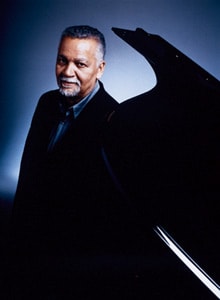Joe Sample Takes a Solo Tour of Jazz's Past
BUENA PARK, CA (September 17, 2004) Two years ago, jazz piano legend and Yamaha artist Joe Sample revisited his Texas childhood with the eclectic CD The Pecan Tree. Now, he's taking another look back to the roots of the music he loves. Soul Shadows, due out next month on PRA Records, takes Sample and his listeners down to basics with a selection of all-solo pieces.
"The new album is in honor of those musicians in the first half of the 20th century who shaped gospel, blues, jazz, and dance music-all of what gave the musicians of the second half of the 20th century a foundation," explains the 65-year-old founding member of The Crusaders.
Soul Shadows will feature Sample's interpretations of cuts like Jelly Roll Morton's "Shreveport Stomp," Fats Waller's "Ain't Misbehaving," Scott Joplin's "The Entertainer" and George Gershwin's "Embraceable You." Two of the tracks are live recordings from a December 2003 performance in Yokohama, Japan: Waller's "Jitterbug Waltz" and Sample's own composition "Melodies of Love." "I played in a particular style for each piece," Sample explains. "How would I have played that if I could transport myself back to World War I, back to Storyville, back to Harlem during the renaissance of the 1920s and '30s, back to the 1890s when Joplin was writing his most important rags?" The new album also features a special interpretation of "How Ya Gonna Keep 'Em Down on the Farm?" as a tribute to the World War I-era 369th Infantry Band, better known as the Harlem Hellfighters. Distinguishing themselves as both musicians and soldiers they were the first American troops to cross the Rhine, and served more time in combat than any other U.S. unit in the war the all-black Hellfighters were an incalculable force in bringing African-American music to Europe, and legitimizing it at home. "I have a recording of them, and what you're listening to isn't anything like Souza," Sample notes. "This is jazz. And France hasn't been the same since." Sample owns two Yamaha pianos, one in each of his homes in California. Plans for a piano room in his Houston home, like the house itself, are something the artist says he's still working out. Recently, he donated a Yamaha grand piano he'd had since 1963 to the Town of Mammoth Lakes, CA. One revelation he offers is that as a development tool, he keeps both his Yamaha pianos set up with extra weight on the keyboards. "They're like a gymnasium for the hands," he says. "The writing that I have done on those two pianos is tremendous. The extra weight is the opposite of the weightless keyboards on a synthesizer; I can't play a synthesizer. I need some sort of resistance to really feel the keys. Of course, it also strengthens my fingers." In Soul Shadows, Sample uses that strength to give listeners a glimpse of the musical thrills that first drew him into jazz as a young man. "I remember in the early 1950s when I was fascinated with Fats Waller and Art Tatum, James P. Johnson, Teddy Wilson," he explains. "I've always had love and respect for the two-handed pianist, because it was the complete piano. I realized that had come to an end, because bebop was the method of the day, and the concept of what the pianist did in bebop limited the role of the jazz piano. I love what Bud Powell did; I love what Thelonious Monk did, and all of the great beboppers. But then I realize the physical skills, the effort, the sheer fun of sitting at the piano all by yourself without a bass and drums. That is the real world of piano playing." To learn more, write Yamaha Corporation of America at P.O. Box 6600, Buena Park, CA 90622-6600; telephone (714) 522-9011; e-mail infostation@yamaha. |
 |
| © 2010 Yamaha Corporation of America. All rights reserved. |

